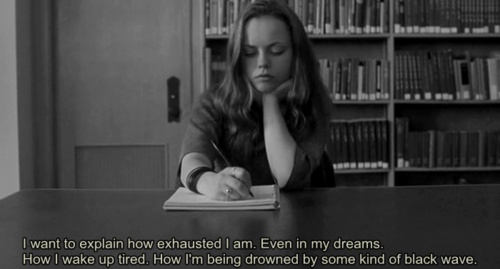The picture above is taken from one of my favourite books that was made into a movie. Prozac Nation focuses on the nitty gritty of what it is like being depressed and how it can affect your entire life. I myself was officially diagnosed with clinical depression in 2008 and have fought an uphill battle trying to conquer it along with my Crohn's. I currently take medication to manage my depression as well as medication that aids me to sleep and quiet my many thoughts and worries I often have.
I am positive that anyone with Crohn's experiences some form of depression at some point; feeling a loss of normalcy in life and having so many physical stressors to deal with. But I also know that many people who don't have Crohn's experience some form of mental illness at some point in their life and it is important for us to stop being silent and start being real. I am not ashamed of my depression, though somedays I feel like Crohn's, it has become a part of me and it is something I have to fight to keep at bay. This is a passage from Elizabeth Wurtzel's Prozac Nation that I feel sums up depression:
“I have studiously tried to avoid ever using the word 'madness' to describe my condition. Now and again, the word slips out, but I hate it. 'Madness' is too glamorous a term to convey what happens to most people who are losing their minds. That word is too exciting, too literary, too interesting in its connotations, to convey the boredom, the slowness, the dreariness, the dampness of depression. But depression is pure dullness, tedium, straight up. Depression is, especially these days, an overused term to be sure, but neve one associated with anything wild, anything about dancing with a lampshade on your head and then going home and killing yourself. The word madness allows its users to celebrate the pain of its sufferers, to forget that underneath all the acting-out and quests for fabulousness and fine poetry, there is a person in huge amount of dull, ugly agony. Let's call it depression and admit that it is very bleak. Sure madness draws crowds, sells tickets, keeps The National Enquirer in business. Yet so many depressives suffer in silence, without anyone knowing, their plight somehow invisible until they adopt the antics of madness which are impossible to ignore. Depression is such an uncharismatic disease, so much of the opposite of the lively vibrance that one associates with madness. Forget about the scant hours in her brief life when Sylvia Plath was able to produce the works in Ariel. Forget bout that tiny bit of time and just remember the days that spanned into years when she could not move, could not think straight, could only lie in wait in a hospital bed, hoping for the relief that electroconvulsive therapy would bring. Don't think of the striking on screen picture, the mental movie you create of the pretty young woman being wheeled on the gurney to get her shock treatments, and don't think of the psychedelic, photonegative image of this same woman at the moment she receives that bolt of electricity. Think instead, of the girl herself, of the way she must have felt right then, of the way no amount of great poetry and fascination and fame could make the pain she felt at that moment worth suffering. Remember that when you're at the point at which you're doing something as desperate and violent as sticking your head in the oven, it is only because the life that preceded this act felt even worse. Think about living in depression from moment to moment, and know it is not worth any of the great art that comes as its by-product."
Going on medication was not an easy decision, but it was the right one. After losing my grandmother in 2009 and losing a close friend shortly after, I knew I needed the stability that my brain could not provide me. What many forget is that depression is a chemical imbalance, it is not a choice to be sad. Losing a friend to depression/suicide feels like the most inhumane experience. It is simply overwhelming, debilitating and complicated. I wish that I would have been more open then about my feelings with him, in hopes that maybe it would have encouraged him to be proactive with his illness. I hope that from this point forward, maybe sharing will equal more awareness, so that any of you will be open when you are going through tough times. This one is for J, whom I miss and love each and every day.
On a last note, I think it is important for you to all know that your family and friends can also make a huge impact on your mental health. Without my family's support with all my illnesses, I would certainly not be where I am today. They have picked me up off the floor time and time again, and I'm lucky that they have been as understanding as possible during the tough times. I'm so grateful for all of their support.
Happy Monday friends,
xoxo e


 RSS Feed
RSS Feed